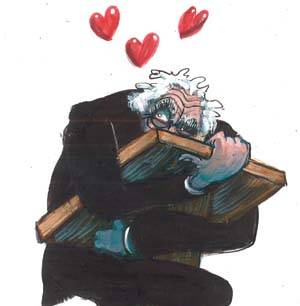There's something odd about the way in which some of the words we use most, words that describe who we are and how we live, are also the most vague. There can't be a day goes by in all our lives without our hearing, saying or reading the word "family", and yet there is very little agreement about what a family is. What's more, as individuals we tend to be very slap-happy about who's in and who's out of our own particular family. This ought to dent those who want to put "family-values" on the political agenda, but strangely, it doesn't.
Look at us: husband, wife, two kids – we say that's a family. We know that, because that was how David Mellor posed at his garden gate after he had found another sexual partner. Similarly, we know that Tony and Cherie Blair live in a family, and, we were told, asserted family values when one of the kids was found drunk in a gutter. I'm not sure about the other Tony, Mr Booth. Is he in or out?
It's a reasonable question because when it comes to the royals, then it all expands. When they stand on the balcony of Buckingham Palace, some people turn up there who I don't think I've ever seen before: shadowy blokes with beards, ladies with hats and unfamiliar clean children. And then, if you have any memory of previous balcony shots, some people seem to have been trotskied, painted out. A Martian arriving to enjoy the scene might easily start asking questions like, where's that chap's dad? And back would come the answer: once the Snowdon fellow was in the family, now he isn't. In other words, families can have people whose membership has lapsed.
On a more personal level, who's in your family, or rather, who doesn't quite make it? Are your cousins in or out? What about second cousins? Or the partners of your blood-related aunts and uncles? And then what happens when there are splits and divorces? This, after all, is how we are living now and it raises a whole feast of problems for the word 'family'.
Grandparents know this if they "lose" their grandchildren. Many of us know of people whose offspring have had children, or there was a casual liaison that produced a child but, following a split, they were unable to see these grandchild(ren). So who's in the family and who's out, in this case?
dear joe, your wild noisy huge brother
is dead. I couldn't do what my parents did:
bring two boys, four years apart through the maze.
I don't know if I'll find my way as well
as they did, seeing as they lost one
back near the beginning.
from Carrying the Elephant: A Memoir of Love and Loss
by Michael Rosen, published by Penguin
Then, there are many of us who help bring up children who are not "ours" genetically, ie step-children. Years ago, this could be kept tidy, as it was very unusual for the situation to be repeated. That's to say, the step(s) would be incorporated into one new family and that's how it tended to stay. But, of course, divorces can happen in families with step-children too. Serial monogamy can produce a kind of two- or three-tiered family with biological and step-children joining and departing along the way. As I can testify, a step-child doesn't always go with the biological parent.
But even all this doesn't deal with the full complexity of how we live: gays and lesbians are born into families and create families. A friend of mine seems half way along the line to adopting his son's child. I know someone who fostered a child for over ten years. What would a Martian, or even a home-grown anthropologist make of all this?
I guess one of the questions they would ask is about sex. They would see that there are laws about bigamy but then they might quickly become confused by the fact that people not only practise serial monogamy, but many, many people have more than one sexual partner while still appearing to be in a monogamous set-up. Incidentally, they might chuckle to hear this still referred to as 'having an affair'. So if this isn't monogamous activity, and it isn't really bigamous either, what is it? And I guess this would have to include the arrangements of ménage à trois, à quatre, swingers and things I wot not of.
I have a sense in all this that as people make all these new patterns of life, it becomes very difficult to find words and phrases to describe what's going on. Maybe that needs qualifying. Those of us making the new patterns usually find ways of talking about things, but those in authority find it harder: "living as man and wife" is one that always tickles me, as if "man and wife" is the benchmark of normality and certainty. After all, living as man and wife, could mean having affairs and ignoring each other!

